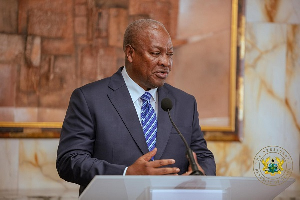A top banker yesterday confirmed that the rate of inflation in the country is now 29.4%, going by the criterion that this government has used in the past two years for its determination.
"The inflation rate can only become 16% as Economic Planning Minister Dr. Paa Kwesi Nduom claims as a result of intellectual dishonesty," said this experienced banker who, because he works at the Bank of Ghana (BOG), spoke under a condition of anonymity.
The BOG official pointed out that since December 2000, the NPP Government has consistently quoted “inflation over 12 months” figures as determined by the Ghana Statistical Service (GSS) in its compilation of the Consumer Price Index (CPI). He said this "inflation over 12 months" figure was 40.5% as at December 2000 and dropped to 21.3 by December 2001, and again declined gradually to 16.3% in January 2003.
"But now that various factors have contributed to inflation jumping to 29.4% in February 2003 using the same formula, they are rejecting it for political expediency. The government is shifting to a measure of inflation they have not used in the past 24 months. This is very, very dishonest, fraudulent really, if the truth must be told", he said.
The BOG "Deep Throat" explained that the measure of inflation that the government had suddenly found attractive is the "yearly inflation" which is determined by the GSS from the calculation of the CPI.
"The yearly inflation figure for February 2003 is 15.6%, just as quoted by Dr. Nduom, but that excludes the impact of the 90.4% increase in fuel prices effected towards the end of January 2003", he said.
Our source said that if the government is now using the yearly inflation figure, then it should admit that the economy it inherited was good as the yearly inflation for December 2000 was just 25.2%.
Attempting an explanation for the present woeful state of the economy, the source said that the Economic Management Team (EMT) failed to repeat its excellent performance of 2001 last year.
"Deep Throat" pointed out that statistical figures compiled since last year showed that the macro-economic situation was getting very bad.
He noted that the economic fundamentals being implemented by the NPP government at the time of the first petroleum price hike of 66.4% in March 2001 were excellent. Hence, he explained, the impact of the price hike on inflation was negligible.
He said the latest inflation figures have, however, confirmed that the accelerating recovery in the first year of the Kufuor administration has been put on hold, particularly by the excessive rise in the prices of petroleum products in January this year.
He said the team so messed up the economy in 2002 that money supply soared to an unprecedented 50 percent. Another cause for the mess, he noted, was the budgeting for foreign inflows. He said government has been computing its revenue generation for last year using figures that included the $1.4 billion that Ghanaians abroad remitted to their relations here.
"This was money paid directly to recipients to, among other things either carry out building projects or pay school fees. So how anyone can treat it as part of official inflows, beats the understanding" he noted.
According to the source, the coup de grace that put the economy in the woods is the 90.4 per cent increase in petroleum prices. That single event turned prices on their heads across the board, he said.
Analysts polled by The Heritage yesterday expressed dismay at the implied attempt to discredit the GSS.
"A government that will discredit its own statistical service merely to score political points, is one that ought to be watched closely," they indicated.
The attempt to revise the inflation rate has also created problems for the Bank of Ghana. Fixing the Prime Rate would become a real challenge and commercial banks may decide to ignore the Bank and determine their own rates.
Business News of Wednesday, 26 March 2003
Source: Heritage












